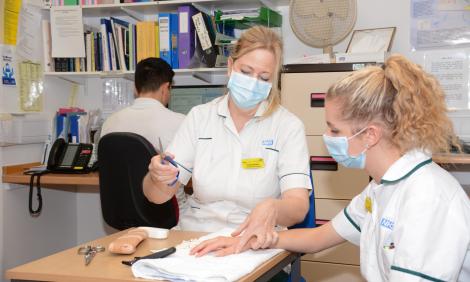Physiotherapy assistants/support workers
Physiotherapy assistants make a difference to the lives of our patients every day by helping them recover from a range of illnesses and conditions. It is also a route to becoming a physiotherapist.
Working life
Working with a physiotherapist, your work could involve:
- setting up equipment
- showing patients how to use mobility aids
- helping patients prepare for treatment (including helping with dressing and undressing)
- working on exercises with patients
- writing reports and updating patients’ records
You may work with individuals or groups of all ages and situations with a range of conditions, including
- neurological (stroke, multiple sclerosis, Parkinson's)
- neuromusculoskeletal (back pain, whiplash associated disorder, sports injuries, arthritis)
- cardiovascular (chronic heart disease, rehabilitation after heart attack)
- respiratory (asthma, chronic obstructive pulmonary disease, cystic fibrosis)
You could be working in
- outpatients' departments
- women’s health
- elderly care
- stroke services
- orthopaedics
- mental health and learning disability services
- occupational health
- paediatrics
Some physiotherapy assistants work in the local community. They could be based in health centres. Some treat patients in their own homes, nursing homes, day centres or schools. Others work in private clinics and voluntary organisations or charities.
As well as working with physiotherapists, physiotherapy assistants work with other healthcare professionals including occupational therapists, orthopaedic surgeons, prosthetists, orthotists and nurses. They spend a lot of time with patients.
Entry requirements
There are no set entry requirements for physiotherapy assistants. Employers expect good numeracy and literacy and some experience or qualifications in health or social care. Employers may ask for GCSEs in English and maths. They may ask for a BTEC or equivalent vocational qualification in health and social care.
Employers often ask for relevant work experience. Even where this is not specified, it would be an advantage if you have worked in health or social care, either in paid employment or voluntary work. Apprenticeships in healthcare can provide you with experience to apply for physiotherapy assistant and other support roles.
If you're applying for a role in the NHS, you'll be asked to show how you think the NHS values apply in your everyday work.
Personal characteristics and skills needed
Physiotherapy assistants need to be
- happy to be hands-on with patients
- willing to demonstrate exercises
- able to use gym equipment
- good listeners
- calm and understanding
- happy to talk to and work with groups
- able to follow procedures
- able to motivate people
- willing to work alone or in a team
- physically fit
You'll also need
- organisational skills
- good communication skills
- ability to explain treatment to patients
Training and development
You will be given the training you need to do the job, including an introduction to the department and its procedures and how to set up and use the equipment.
You may be offered the chance to study for qualifications such as
- the NCFE CACHE level 2 Certificate in Healthcare Support Services
- the NCFE CACHE level 3 Diploma in Healthcare Support
Physiotherapy assistants can become associate members of the Chartered Society of Physiotherapy. The Society runs courses, conferences and seminars where physiotherapy assistants can update their skills and network with others doing similar work.
With experience, you could become a team leader supervising the work of other physiotherapy assistants. You could apply to train as an assistant practitioner or, with the qualifications needed for entry into university, as a physiotherapist.
Pay and benefits
Your standard working week will be around 37.5 hours and may include a mix of shifts, such as nights, early starts, evenings and weekends. You’ll be paid on the Agenda for Change (AFC) pay system, typically starting on band 2.
You’ll also have access to our generous pension scheme and health service discounts, as well as 27 days of annual leave, plus bank holidays, which increases the longer you’re in service.





